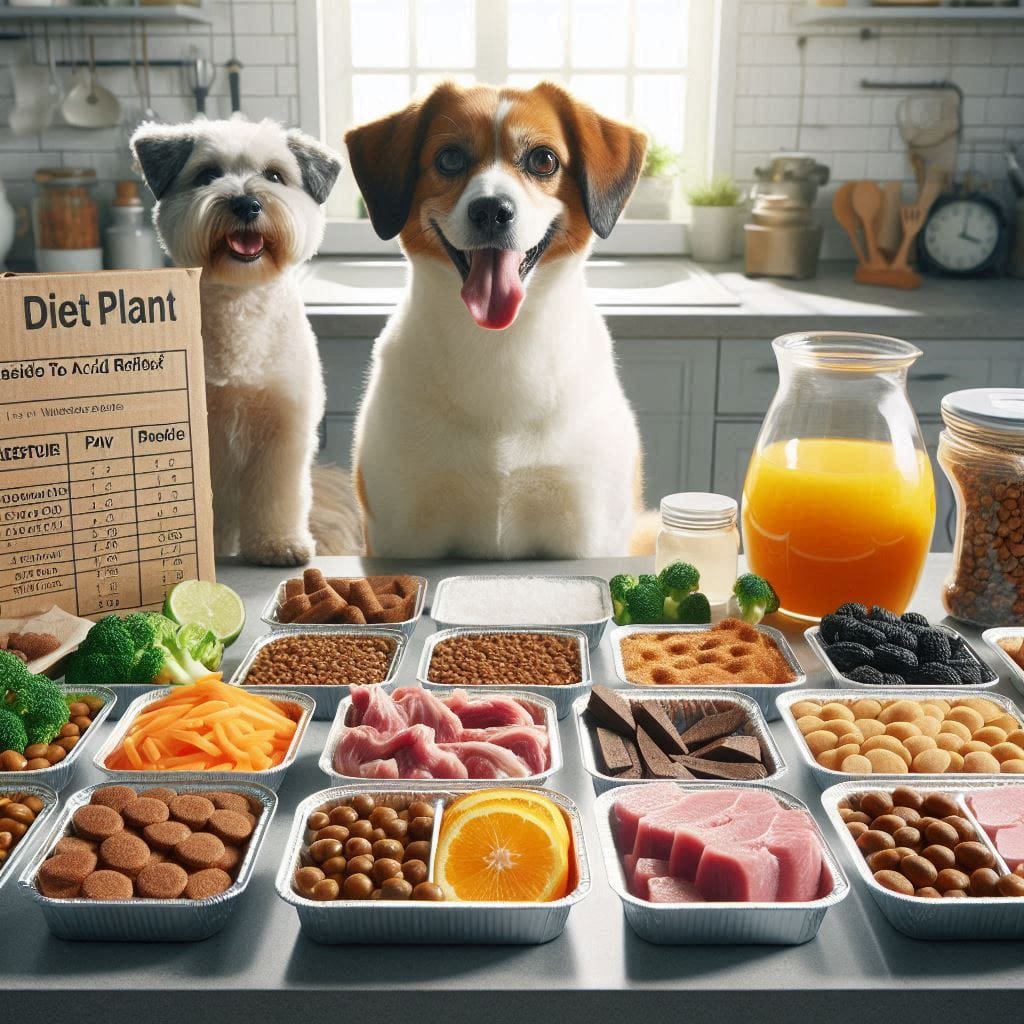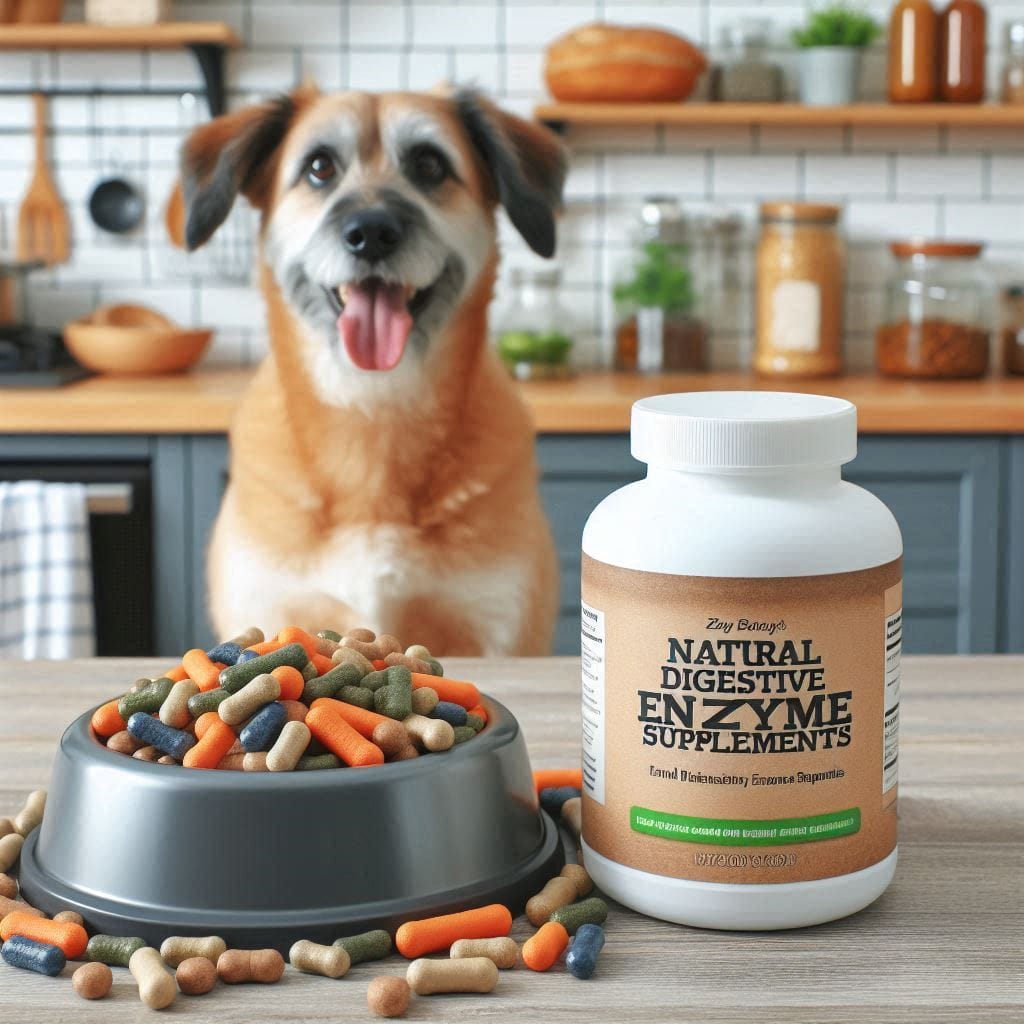Home Remedy: Acid Reflux Relief for Dogs
Welcome to the canine world, where acid reflux isn’t just a human problem. Yes, you heard it right! Even our furry friends can experience that burning sensation from stomach acid. Don’t fret; nature has a remedy. This blog post explores a home remedy for acid reflux in dogs, relieving your four-legged companion.
From understanding dog acid reflux symptoms to harnessing the power of digestive enzymes, we’ll guide you through safe, effective ways to treat this common canine condition. So, fasten your seatbelts and prepare to delve into a world of natural remedies that can help soothe your dog’s troubled tummy.

Recognizing Acid Reflux in Dogs: Common Symptoms
Have you ever watched your dog struggle with a bout of acid reflux? It’s a tough sight, and understanding the problem is the first step towards providing relief. The most common symptoms include excessive drooling, frequent vomiting, and loss of appetite.
Luckily, there’s a home remedy that can help. Mixing a teaspoon of apple cider vinegar with your dog’s water can balance out stomach acid, reducing reflux symptoms. A change in diet may also be beneficial; smaller, more regular meals can ease digestive stress.
Here’s a quick list of suggestions:
- Add Apple Cider Vinegar to the water
- Adjust the feeding schedule to smaller, more frequent meals
- Include natural probiotics in their diet
- Provide a comfortable resting area to reduce stress
- Regular exercise to maintain optimal weight
Remember, it’s crucial to observe your dog for any noticeable changes. If symptoms persist, consult with a vet to ensure proper treatment.

Root Causes of Acid Reflux in Dogs
Acid reflux, or gastroesophageal reflux disease (GERD), is a common health issue in dogs. It occurs when the stomach acid flows backward into the esophagus, causing your dog a burning sensation and discomfort. Just like humans, dogs can also experience acid reflux. Many pet owners turn to home remedies to help relieve their furry friends’ discomfort.
One of the most effective home remedies to treat acid reflux in dogs is to adjust their diet. Providing a diet high in protein and low in fat can help prevent the buildup of stomach acid. This diet, coupled with the use of natural digestive enzymes, can provide your dog with much-needed relief.
Here are a few more remedies for dog acid reflux you might find useful:
- Try smaller, more frequent meals
- Avoid spicy and high-fat foods
- Consider a natural supplement like Slippery Elm
- Provide plenty of fresh water
- Avoid stress-inducing situations
Remember, early detection of your dog for developing acid reflux signs is key to effective treatment.

Effective Steps to Diagnose Acid Reflux in Dogs
Spotting acid reflux in our furry friends may not always be a walk in the park. Your dog may have an acid problem if they show signs like frequent burping, loss of appetite, or discomfort after eating. The good news is there are home remedies to provide relief.
Let’s start with a simple yet effective method: adjusting your dog’s diet. Minimize fatty foods as they can increase stomach acid production. Additionally, introducing digestive enzymes can help break down food, reducing the chance of reflux.
Increasing meal frequency but reducing portion sizes can also be beneficial. This method prevents the stomach from becoming too full, thus reducing the likelihood of reflux.
Lastly, some natural stomach acids can be friends, not foes. A splash of apple cider vinegar in their water can help balance stomach acidity levels.
These steps should help relieve acid reflux in your dog. It’s always best to consult a vet if symptoms persist.

Navigating Medications for Dog Acid Reflux: A Brief Overview
If your dog is suffering from acid reflux, it can be distressing to watch, let alone know how to help. Thankfully, there’s hope in the form of a home remedy. A useful tip is adding natural stomach acid regulators like digestive enzymes to your pet’s food. This could aid digestion and reduce the likelihood of reflux.
Another way to curb acid reflux in dogs is to monitor their diet carefully. Some pets might need to avoid certain foods that trigger their acid reflux. In this case, consider alternatives like lean proteins and whole grains for your dog.
Don’t forget to keep an eye on their behavior post-meal. You can observe acid reflux signs in real-time and adjust your remedy approach accordingly with an acid reflux cam.
Remember, these are just broad suggestions. Effective dog acid reflux treatment should be tailored to your pet’s needs. If symptoms persist, always consult a vet.

Achieving Acid Reflux Relief for Dogs: Natural Home Remedies
So, your furry friend has acid reflux. Let’s talk about ways to provide some relief at home. Luckily, several natural remedies can help your dog.
Chewing is one way. It stimulates the production of digestive enzymes that can combat acid. Try offering your dog a hard, digestible chew toy to gnaw on. This might seem simple, but it’s an effective dog acid reflux remedy.
Surprisingly, apple cider vinegar can also be beneficial. Although it’s an acid, it helps balance your dog’s stomach acid, reducing reflux. A small amount mixed into their water bowl can do the trick.
Lastly, probiotics can help too. They promote a healthy gut and can regulate stomach acid levels, alleviating reflux in dogs.
These remedies have received rave acid reflux testimonials. They’re natural, easy to implement, and can relieve your dog’s acid reflux. And remember, every dog is unique. What works for one might not work for another. You know your dog best, so trust your instincts and consult a vet if symptoms persist.

Harnessing the Power of Digestive Enzymes for Dogs
Your dog might be suffering from acid reflux if they’s frequently vomiting, have a decreased appetite, or show signs of pain while swallowing. Unlike humans, dogs can’t tell us when they’re feeling unwell, making it important for us to keep an eye out for potential health issues.
One home remedy that can help with reflux in dogs involves digestive enzymes. You might be thinking, “Digestive enzymes? What are those?” These proteins break down food into nutrients, aiding digestion and reducing the acid in your dog’s stomach.
Adding digestive enzymes to your dog’s meals is suggested to treat acid reflux. You can find these in health food stores. They’re easy to administer, usually in powder form, and can be incorporated into your dog’s food. This will help your dog digest meals effectively and decrease the chances of acid reflux.
Just like us, our dogs need a little help sometimes. And with this natural remedy, you’re naturally treating acid reflux in dogs. Remember, always consult with a vet for severe cases.

Understanding the Role of Probiotics in Dogs’ Stomach Health
When your furry friend starts showing discomfort, it could be due to acid reflux. This common condition isn’t exclusive to humans. Yes, even dogs can experience the unpleasant burning sensation in their stomach.
This condition, known as dog acid reflux, can be quite a hassle. But worry not; there are solutions right at your fingertips! One of these is a home remedy that uses digestive enzymes. These enzymes aid in breaking down food, thus minimizing the chance of reflux.
Another approach is using probiotics. These friendly bacteria improve gut health in dogs naturally, promoting better digestion and reducing stomach discomfort.
Acid reflux in dogs can be managed with simple changes in diet and lifestyle. Small frequent meals can prevent overeating, a common trigger for reflux.
Lastly, an acidic stomach can benefit from certain foods that neutralize acidity. For instance, a spoonful of natural yogurt can soothe your dog’s upset stomach.
These are just a few ways to treat acid reflux at home. Always consult your vet to ensure your dog’s health.

Meal Planning for Dogs with Acid Reflux: What to Feed and Avoid
Home remedies could be a safe and soothing solution if your dog is battling acid reflux. These remedies may relieve your pet’s reflux problems while reducing the risk of negative side effects linked with some medications.
A simple change in diet can work wonders. Avoid high-fat foods and opt for a low-protein, high-fiber meal plan. Incorporating acid-neutralizing foods like sweet potatoes can also help.
Here’s a list of food items beneficial for dogs with acid reflux:
- Sweet potatoes
- Oatmeal
- White rice
- Pumpkin
- Blueberries
- Green beans
- Bananas
Remember to feed your dog smaller, more frequent meals to ease digestion and lessen the chances of reflux. Also, keeping your dog upright for about 30 minutes after meals can help prevent stomach contents from flowing back up. Regular vet visits are crucial for monitoring your dog’s condition and adjusting their meal plan.

Exploring Diet Changes to Alleviate Dog Acid Reflux
Your furry best friend might be dealing with dog acid reflux, a common condition in our four-legged friends. But don’t worry – you’re not alone in this. Many pet owners are turning to home remedies as a way to provide relief to their beloved pups. A few small changes in your dog’s diet can make a big difference in managing their acid reflux.
Here is a list of food items that can help to ease your dog’s discomfort:
- Brown rice: It’s gentle on the stomach and can help prevent acid build-up.
- Boiled chicken: Lean proteins are easier for dogs to digest.
- Sweet potatoes: They’re high in dietary fiber, which can promote a healthy digestive system.
- Yogurt: Contains probiotics that can aid digestion.
- Apples: Rich in fiber, but remember to remove seeds and core.
- Cucumber: Hydrating and easy on the stomach.
- Ginger: Known for its anti-inflammatory properties.
A shift towards a more natural diet can be a game-changer in managing reflux in dogs. Just remember, every dog is unique. Monitor your pet’s reactions to these foods and adjust their diet accordingly. It’s always a good idea to consult with a vet before making any major changes to their diet.
Managing Your Dog’s Acid Reflux: Long-term Strategies and Tips
Dealing with dog acid reflux can be a challenge. But don’t fret! There are effective home remedies to help your furry friend find relief.
First, a diet change is a good start. Opt for easily digestible foods that won’t upset your pet’s stomach. Brown rice and boiled chicken are excellent choices.
Secondly, consider adding a probiotic to their meals. Probiotics can aid in digestion and prevent acid build-up.
Lastly, make sure your dog isn’t eating too quickly. Fast eating can cause acid reflux. Try using slow feeder bowls or puzzle feeders to regulate their eating speed.
These tips should help ease your dog’s discomfort naturally. Always remember to consult a veterinarian before making any significant changes to your pet’s diet or routine.
Managing acid reflux in dogs can be a process, but with patience and the right approach, your pet can lead a happy, healthy life.
